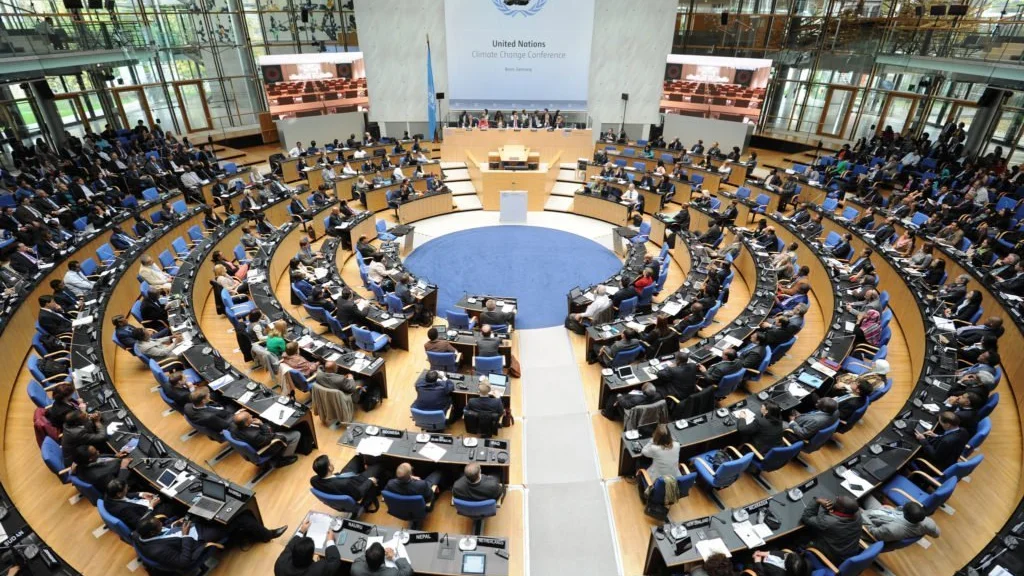Overview: The Conference of the Parties 29

Jan. 18, 2025 • Yuvraj Pandey (University of Allahabad)
Student's Pen
CONFERENCE OF PARTIES- 29
INTRODUCTION TO COP:
The Conference of Parties is one of the essential governing bodies of the United Nations Framework Convention on Climate Change. It is an important event that is concerned with tackling the global climate challenges. This was established in a treaty in 1992 which included 197 countries and the European Union. They hold their conferences once every year. These conferences aim to bring together all member nations to negotiate, mitigate, adapt, finance and bring solutions for climate change. In this article, we will be learning about the recent conference of parties, its significance, its outcomes, and India’s role and stand in this conference.
OBJECTIVES OF COP 29:
The recent Conference of Parties was the twenty-ninth meeting. This conference was hosted in Baku, Azerbaijan from November 11, 2024, to November 22, 2024. COP29 focuses on several key areas –
To establish a new collective quantified goal (NCQG) to support climate efforts in developing countries.
To promote the exchange of climate-friendly technologies for global mitigation and adoption of new techniques for climate change.
Encourage collective progress towards objectives of the Paris Agreement, 2015.
Enhance commitments to reduce greenhouse gas emissions while implementing new strategies.
THEME OF COP 29:
The theme of COP 29 itself explains its goals of climate finance, mitigation, adaptation strategies and stocktaking. The 2024 United Nations Framework Climate Change Conference (UNFCCC) titled this conference as “Investing in a liveable planet for all”.
HISTORICAL CONTEXT AND SIGNIFICANCE OF COP 29:
COP meetings have played an important role in giving shape to climate change policies globally. There have been several key milestones in these meetings that have helped us to tackle this problem. Some of these key milestones are as follows-
Kyoto Protocol: It was held in 1997 and discussed in COP3 where it was decided that the industrialized nations will reduce emissions, setting a target of 4.2% reduction from 1990 to 2012.
Copenhagen Accord: It was held in 2009 and discussed in COP15. It introduced 2 degrees Celsius as the warning limit and principle of developed countries' funding actions in vulnerable nations. However, have failed in fulfilling this.
Glasgow pact: It was held in 2021 under COP 26. It made member countries promise that they will reduce the usage of coal and fossil fuels. This was the first time when coal was addressed in any UN Climate Agreement.
Loss and damage fund: It was held in 2023 under COP28. This fund was founded to support countries from climate disasters and provide financial assistance for those who are most affected by climate change.
INDIA’S ROLE AND STATUS AT COP29:
India has played a crucial role in COP29. Its role involves-
India co-hosted the lead IT Member meeting with Sweden which majorly focused on the Decarbonization of heavy industries like steel.
India largely promoted solar adoption through the International Solar Alliance (founded by India and Paris). India is widely targeting a twentyfold increase in global solar capacity by 2050.
India has implemented finance unlocking and disaster-resilient support for SIDS.
POSITIVE OUTCOMES OF COP 29:
COP 29 has committed to transparent reporting on climate finance and adaptation efforts. Under the Enhanced Transparency Framework, thirteen countries have submitted their Biennial Transparency Reports (BTR).
A support program has been established at COP 29 for implementing National Adaptation Plans to address climate adaptation for least developed countries (LDC).
One of the major achievements of COP29 was tripling the climate finance for developing countries. E.g. 100 billion dollars for a previous year then 300 billion dollars by 2035.
COP29 completed agreements on carbon market mechanisms which are given in Article Six of the Paris Agreement. This was an unresolved issue for a very long period.
SHORTCOMINGS OF COP29:
Criticism of host nation: Azerbaijan which is an oil-rich nation was largely criticized for being an inappropriate host as it mainly focused on reducing fossil fuel reliance which was somewhere irrelevant for a conference like COP.
Global emissions inequities: The members of G20 accounted for 77% of global emissions underscoring disparities in per capita.
Postponement of NDC updates: This COP 29 did not discuss about NDC updates which is a shortcoming keeping in mind the critical climate conditions globally it has been shifted to COP 30.
Slow operation of loss and damage fund: Progress on this fund was slow, with concerns of inadequate funding to address climate change calamities caused in vulnerable countries.
Deadlock on mitigation and global stocktake: This COP saw a deadlock in the mitigation work programme because of disagreements on topics like fossil fuels.
Unmet emission goals: Our target was to not cross the 1.5 degrees Celsius target but we have failed to achieve it, highlighting that we have insufficient progress in the same.
Overreliance on loans: In this COP we noticed that the financial package focuses more on loans rather than grants which results in increasing debts and burden on developing countries.
Inadequate climate financing: The commitment of tripling the climate finance from 100 billion dollars annually to 300 billion dollars by 2035 falls short of dollar 1.3 trillion dollars which is very less.
WAY FORWARD:
We should focus more on strengthening climate diplomacy especially the mitigation and finance targets for developing countries.
Operationalization of the Loss and Damage fund should be a little fast so that it could help vulnerable countries quickly.
Make the renewable energy rules and regulations binding for all the member nations.
COP meetings should ensure that the negotiations focus on the principle of Common but Differentiated Responsibilities and Respective Capabilities
(CBDR-RC).